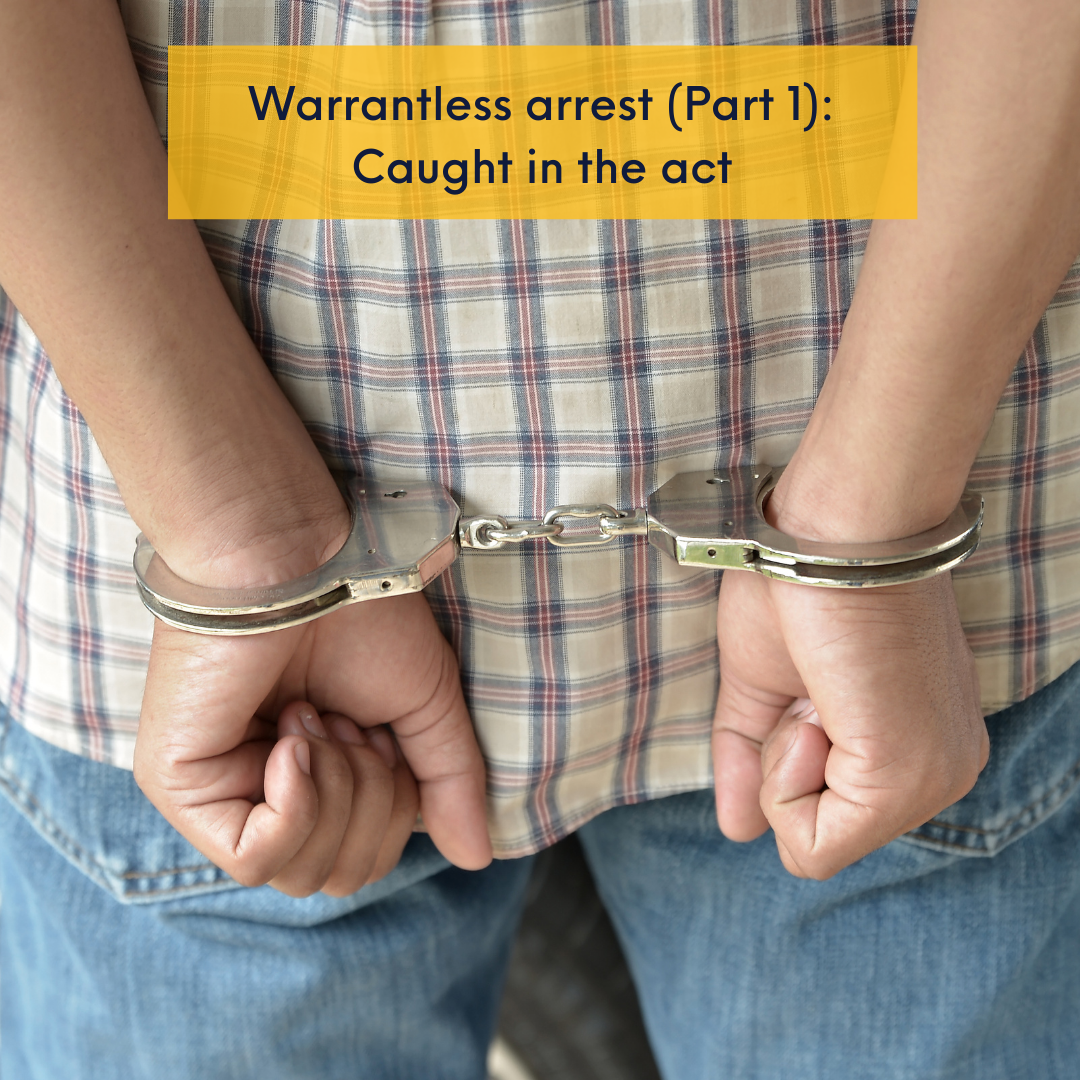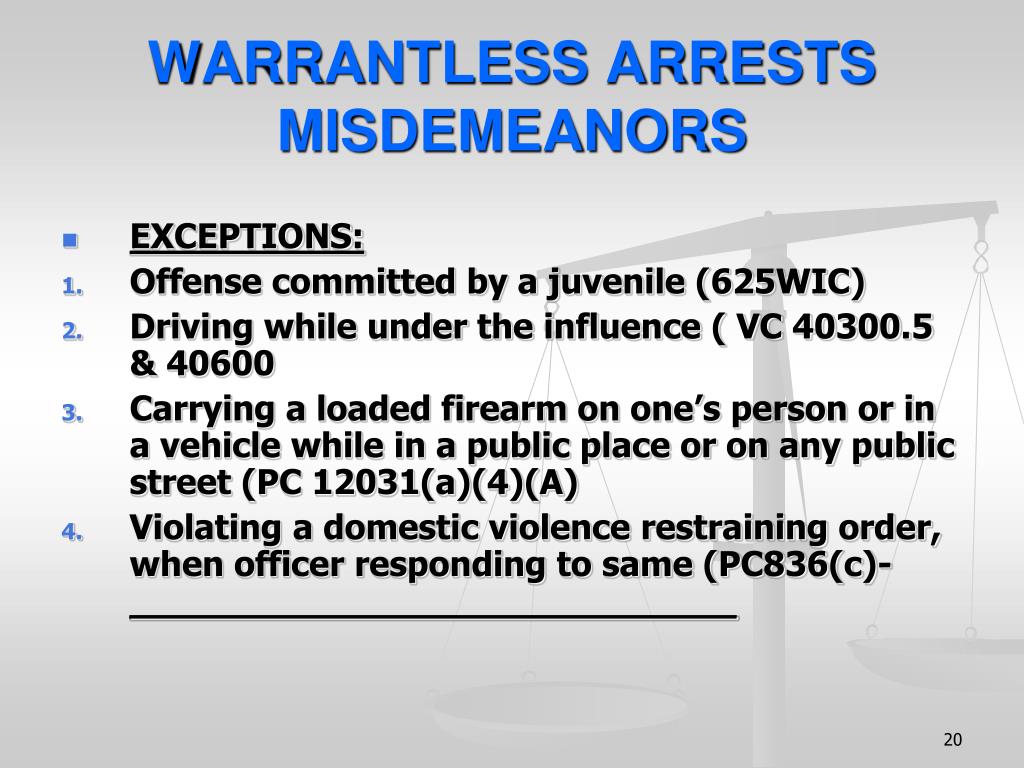Florida Warrantless Arrest - The exceptions included in the statute allow officers to make an arrest without a warrant for a misdemeanor in the following scenarios: Web if the officer reasonably believes that such a felony or misdemeanor as defined by state statute has been committed in her or his presence, the officer may make a warrantless arrest of any person whom she or he reasonably believes to have committed such felony or misdemeanor. (i) failing to appear as required by the terms of that person's release under 18 u.s.c. Web florida statutes section 901.15 lays out the florida misdemeanor exceptions that allow authorities to make a warrantless arrest. If you are charged with a misdemeanor in florida without a warrant, one of the questions an experienced criminal attorney can help determine is if one of the warrantless exceptions to such an arrest applies in your case. Web (a) in general. The arrest of a person may be lawfully made also by any peace officer or a private person, without a warrant upon reasonable information that the accused stands charged in the courts of a state with a crime punishable by death or imprisonment for a term. What are those executions you may ask? Below are outlined requirements to meet the criteria for a warrantless arrest: A law enforcement officer may arrest a person without a warrant when:
(1) the person has committed a felony or misdemeanor or violated a municipal or county ordinance in the presence of the officer. If you are charged with a misdemeanor in florida without a warrant, one of the questions an experienced criminal attorney can help determine is if one of the warrantless exceptions to such an arrest applies in your case. What are those executions you may ask? The exceptions included in the statute allow officers to make an arrest without a warrant for a misdemeanor in the following scenarios: Web if the officer reasonably believes that such a felony or misdemeanor as defined by state statute has been committed in her or his presence, the officer may make a warrantless arrest of any person whom she or he reasonably believes to have committed such felony or misdemeanor. The arrest of a person may be lawfully made also by any peace officer or a private person, without a warrant upon reasonable information that the accused stands charged in the courts of a state with a crime punishable by death or imprisonment for a term. (i) failing to appear as required by the terms of that person's release under 18 u.s.c. A person must be taken without unnecessary delay before a magistrate judge in the district of arrest if the person has been arrested under a warrant issued in another district for: A law enforcement officer may arrest a person without a warrant when: In florida, most arrests for misdemeanor cases have to be by warrant unless they fall under an exception.
Web the 2023 florida statutes (including special session c) 901.15 when arrest by officer without warrant is lawful.—. The arrest of a person may be lawfully made also by any peace officer or a private person, without a warrant upon reasonable information that the accused stands charged in the courts of a state with a crime punishable by death or imprisonment for a term. (i) failing to appear as required by the terms of that person's release under 18 u.s.c. In most situations, law enforcement needs an arrest warrant before taking someone into custody for a misdemeanor. Web the 2023 florida statutes (including special session c) 941.14 arrest without a warrant.—. In florida, most arrests for misdemeanor cases have to be by warrant unless they fall under an exception. Web (a) in general. Web if the officer reasonably believes that such a felony or misdemeanor as defined by state statute has been committed in her or his presence, the officer may make a warrantless arrest of any person whom she or he reasonably believes to have committed such felony or misdemeanor. Below are outlined requirements to meet the criteria for a warrantless arrest: Law enforcement must be present during the commission of all elements of the misdemeanor offense.
Warrantless arrest (1) Caught in the act DivinaLaw
Web if the officer reasonably believes that such a felony or misdemeanor as defined by state statute has been committed in her or his presence, the officer may make a warrantless arrest of any person whom she or he reasonably believes to have committed such felony or misdemeanor. Web (a) in general. A law enforcement officer may arrest a person.
Pin on Carlos Gonzalez Law
(1) the person has committed a felony or misdemeanor or violated a municipal or county ordinance in the presence of the officer. In most situations, law enforcement needs an arrest warrant before taking someone into custody for a misdemeanor. (i) failing to appear as required by the terms of that person's release under 18 u.s.c. Law enforcement must be present.
Warrantless arrest of teacher over tweet threatening Duterte
The arrest of a person may be lawfully made also by any peace officer or a private person, without a warrant upon reasonable information that the accused stands charged in the courts of a state with a crime punishable by death or imprisonment for a term. What are those executions you may ask? In most situations, law enforcement needs an.
WARRANTLESS ARREST YouTube
Web (a) in general. What are those executions you may ask? In most situations, law enforcement needs an arrest warrant before taking someone into custody for a misdemeanor. (1) the person has committed a felony or misdemeanor or violated a municipal or county ordinance in the presence of the officer. When all the elements of the misdemeanor were committed in.
Warrantless arrest, may limitasyon sa IRR ng antiterror law ATC
(i) failing to appear as required by the terms of that person's release under 18 u.s.c. Web florida statutes section 901.15 lays out the florida misdemeanor exceptions that allow authorities to make a warrantless arrest. What are those executions you may ask? In most situations, law enforcement needs an arrest warrant before taking someone into custody for a misdemeanor. Web.
Video Presentation on Warrantless Arrest YouTube
Web the 2023 florida statutes (including special session c) 901.15 when arrest by officer without warrant is lawful.—. A law enforcement officer may arrest a person without a warrant when: (1) the person has committed a felony or misdemeanor or violated a municipal or county ordinance in the presence of the officer. If you are charged with a misdemeanor in.
PPT LAWS OF ARREST PowerPoint Presentation, free download ID1013486
What are those executions you may ask? A person must be taken without unnecessary delay before a magistrate judge in the district of arrest if the person has been arrested under a warrant issued in another district for: Web the 2023 florida statutes (including special session c) 941.14 arrest without a warrant.—. In most situations, law enforcement needs an arrest.
What is a Ramey Warrant? Is it different from a regular warrant?
The arrest of a person may be lawfully made also by any peace officer or a private person, without a warrant upon reasonable information that the accused stands charged in the courts of a state with a crime punishable by death or imprisonment for a term. Law enforcement must be present during the commission of all elements of the misdemeanor.
The Difference of a Warrantless Arrest LexClassroom List of the
Web if the officer reasonably believes that such a felony or misdemeanor as defined by state statute has been committed in her or his presence, the officer may make a warrantless arrest of any person whom she or he reasonably believes to have committed such felony or misdemeanor. The exceptions included in the statute allow officers to make an arrest.
Null PDF Arrest Arrest Warrant
What are those executions you may ask? A person must be taken without unnecessary delay before a magistrate judge in the district of arrest if the person has been arrested under a warrant issued in another district for: When all the elements of the misdemeanor were committed in the officer’s presence; (1) the person has committed a felony or misdemeanor.
Web The 2023 Florida Statutes (Including Special Session C) 941.14 Arrest Without A Warrant.—.
In most situations, law enforcement needs an arrest warrant before taking someone into custody for a misdemeanor. (i) failing to appear as required by the terms of that person's release under 18 u.s.c. When all the elements of the misdemeanor were committed in the officer’s presence; What are those executions you may ask?
A Law Enforcement Officer May Arrest A Person Without A Warrant When:
Web florida statutes section 901.15 lays out the florida misdemeanor exceptions that allow authorities to make a warrantless arrest. In florida, most arrests for misdemeanor cases have to be by warrant unless they fall under an exception. Law enforcement must be present during the commission of all elements of the misdemeanor offense. Web if the officer reasonably believes that such a felony or misdemeanor as defined by state statute has been committed in her or his presence, the officer may make a warrantless arrest of any person whom she or he reasonably believes to have committed such felony or misdemeanor.
A Person Must Be Taken Without Unnecessary Delay Before A Magistrate Judge In The District Of Arrest If The Person Has Been Arrested Under A Warrant Issued In Another District For:
Web (a) in general. Web the 2023 florida statutes (including special session c) 901.15 when arrest by officer without warrant is lawful.—. If you are charged with a misdemeanor in florida without a warrant, one of the questions an experienced criminal attorney can help determine is if one of the warrantless exceptions to such an arrest applies in your case. The exceptions included in the statute allow officers to make an arrest without a warrant for a misdemeanor in the following scenarios:
Below Are Outlined Requirements To Meet The Criteria For A Warrantless Arrest:
The arrest of a person may be lawfully made also by any peace officer or a private person, without a warrant upon reasonable information that the accused stands charged in the courts of a state with a crime punishable by death or imprisonment for a term. (1) the person has committed a felony or misdemeanor or violated a municipal or county ordinance in the presence of the officer.









